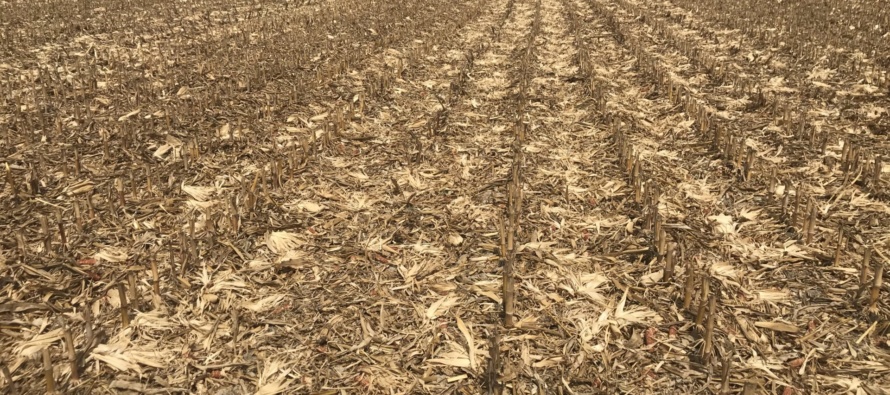Burning Stalks – What does it Really Cost?

Related Articles
- 2010 Soybean And Corn Variety Trial Data 3
- Fertilizing Cotton with Poultry Litter 5
- Spring Nitrogen Fertility Suggestions for Wheat 0
Latest Tweets
Despite all the talk about improving soil health, soil carbon, cover crops and other hot topics, it may be easy to overlook the considerable impact that crop residue management has on soils and future productivity. Following harvest, we face a unique situation because corn produces far more biomass than other row crops, as well as cover crops. Historically, many perceive this corn residue as “trash” or a problem which should be removed by fire or heavily manipulated by tillage. However, crop residue generated in production systems can produce substantial long-term benefits if managed appropriately, particularly since our southern soils are naturally low in organic matter. Kip Cullers, a Missouri farmer who has grown world record yielding soybeans (160.6 bu/a) and won National Corn Growers Association yield contests has said when asked about burning corn residue, “My opinion is that the soil benefits from the return of both root tissue and above-ground crop residues. We rarely use field burning in our high-yield fields. We do everything we can to maintain or increase the amount of organic matter in our soils.”
 Burning crop residue eliminates a precious opportunity to improve soil organic matter content and potentially can lead to substantial nutrient loss. Nearly all nitrogen and at least 75% of sulfur contained in plant residues will be lost upon combustion. These nutrients could be especially beneficial for a wheat crop planted following corn harvest. Although phosphorus and potash are not theoretically lost due to residue combustion, considerable loss will certainly occur from smoke and ash that are not recoverable or recycled into the soil. Some of this occurs during the burn event when ash floats out of your field. Substantial loss may also occur thereafter from wind and rainfall displacing ash from your field. Therefore, if you don’t immediately perform a tillage operation capable of incorporating the ash in the soil, additional nutrients will likely be lost from your field. This can cause considerable fertility limitations in the future and seriously deplete nutrients over the long-term. The associated nutrient replacement cost could be $150 per acre or more for phosphate and potash loss alone, from losing the residue of a high-yielding corn crop.
Burning crop residue eliminates a precious opportunity to improve soil organic matter content and potentially can lead to substantial nutrient loss. Nearly all nitrogen and at least 75% of sulfur contained in plant residues will be lost upon combustion. These nutrients could be especially beneficial for a wheat crop planted following corn harvest. Although phosphorus and potash are not theoretically lost due to residue combustion, considerable loss will certainly occur from smoke and ash that are not recoverable or recycled into the soil. Some of this occurs during the burn event when ash floats out of your field. Substantial loss may also occur thereafter from wind and rainfall displacing ash from your field. Therefore, if you don’t immediately perform a tillage operation capable of incorporating the ash in the soil, additional nutrients will likely be lost from your field. This can cause considerable fertility limitations in the future and seriously deplete nutrients over the long-term. The associated nutrient replacement cost could be $150 per acre or more for phosphate and potash loss alone, from losing the residue of a high-yielding corn crop.
While plants can grow in soils with little organic matter, we face far more issues with fertility, water availability, soil compaction, poor plant health, and erosion on such soils. Furthermore, we will spend considerably more time, management efforts and expenses to overcome these shortcomings arising from low organic matter. So why is organic matter so important? Crop residues and resultant higher soil organic matter improve essentially all soil properties and ultimately enhance crop productivity. In fact, some studies have shown each 1% improvement in soil organic matter improves crop yield potential more than 10%. Additional organic matter affects soils by:
- Improving soil tilth
- Improving soil water holding capability
- Improving water infiltration
- Improving nutrient availability
- Reducing evaporation
- Improving raised bed stability
- Reducing soil erosion
These properties improve root development and greatly enhance plant health, particularly when soil-water relations are challenging. In other words, residue recycling can better accomplish many of the same goals we annually attempt to fix using deep and/or intensive tillage.
Building soil organic matter level should be a primary management goal for southern producers and is a long-term process. Our warm, moist environment inherently limits native soil organic matter levels in our region, because it encourages rapid organic decomposition. Tillage also accelerates decomposition, so reducing soil disturbance will greatly enhance results. Therefore, we encourage you to adapt methods, reduce tillage, and let mother-nature decompose residue during the winter, rather than burning diesel or valuable stalks.




Let me tell You a sad story ! There are no comments yet, but You can be first one to comment this article.
Write a comment